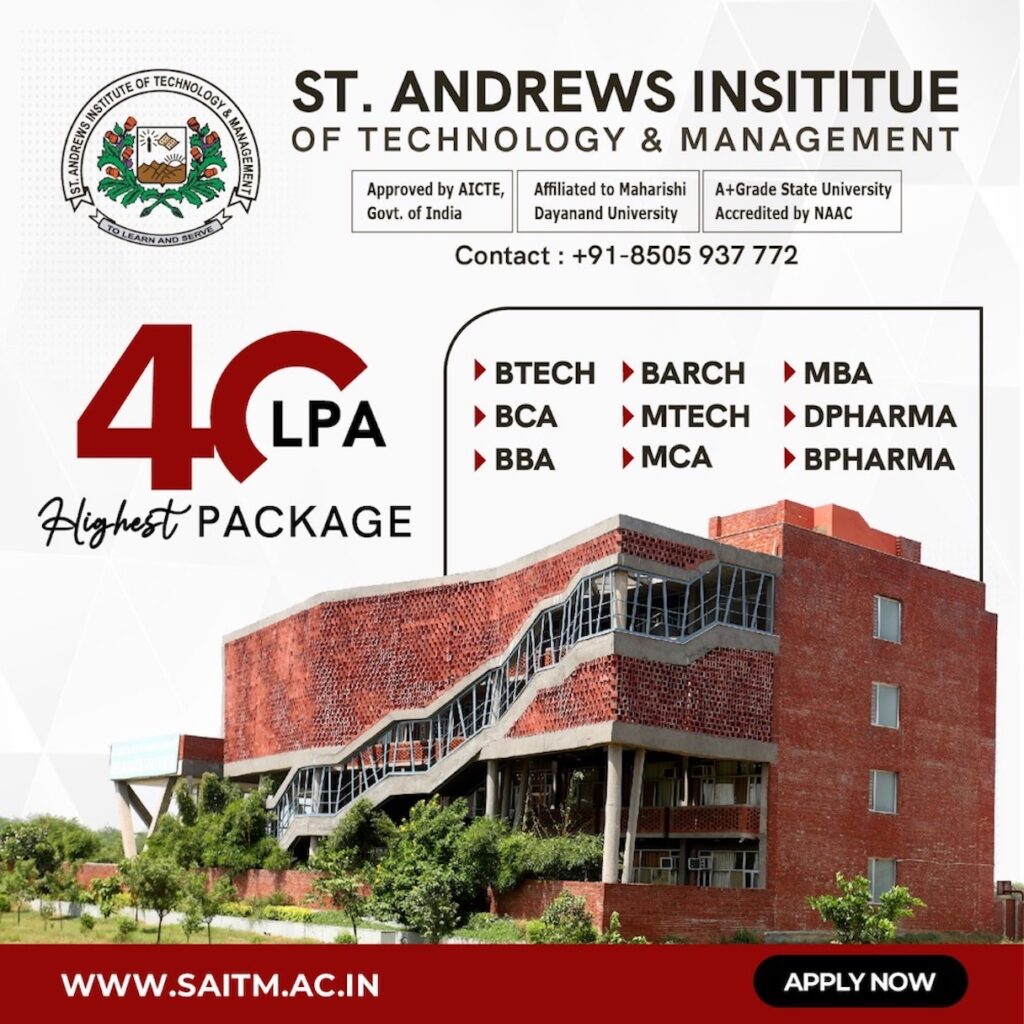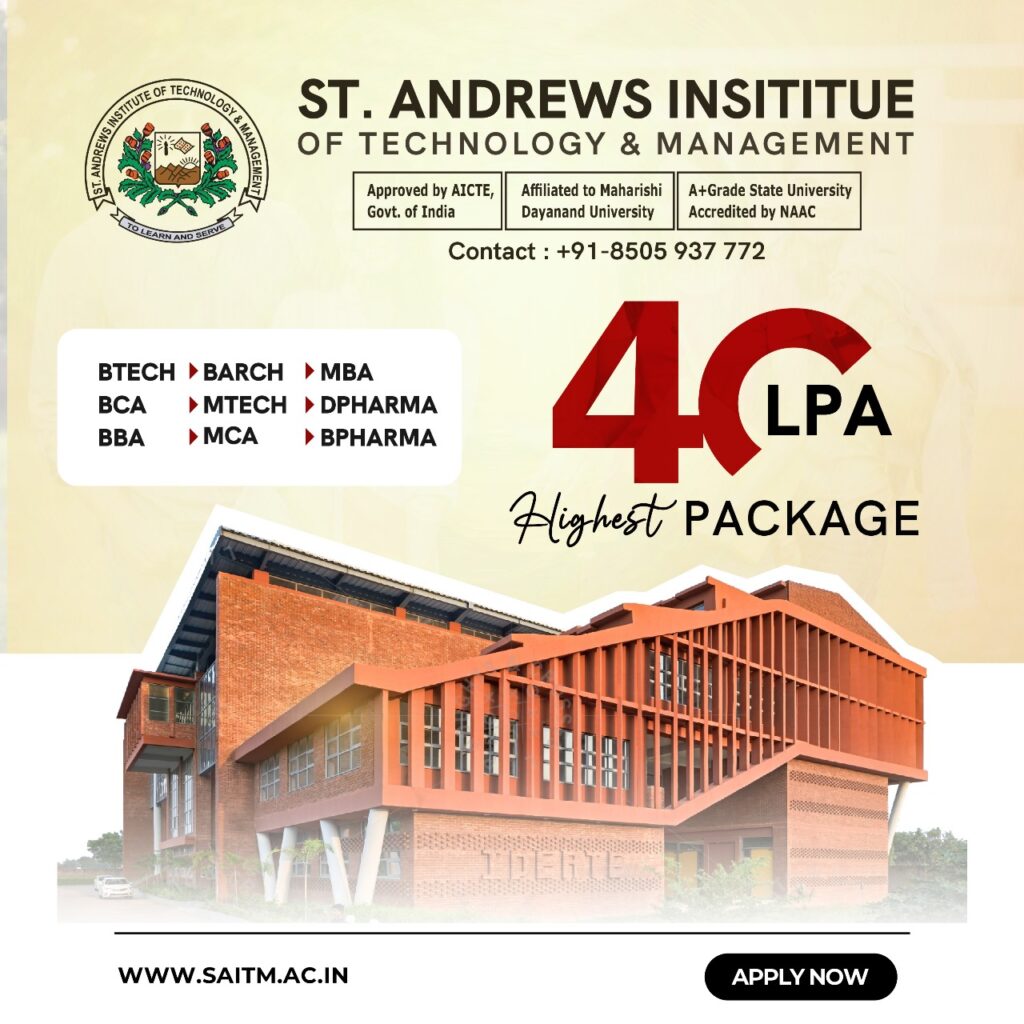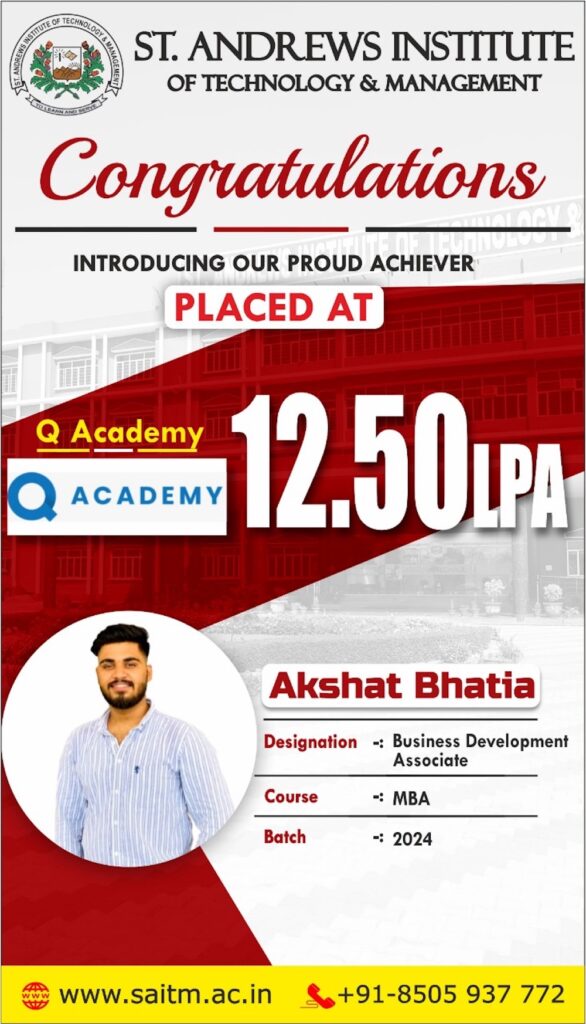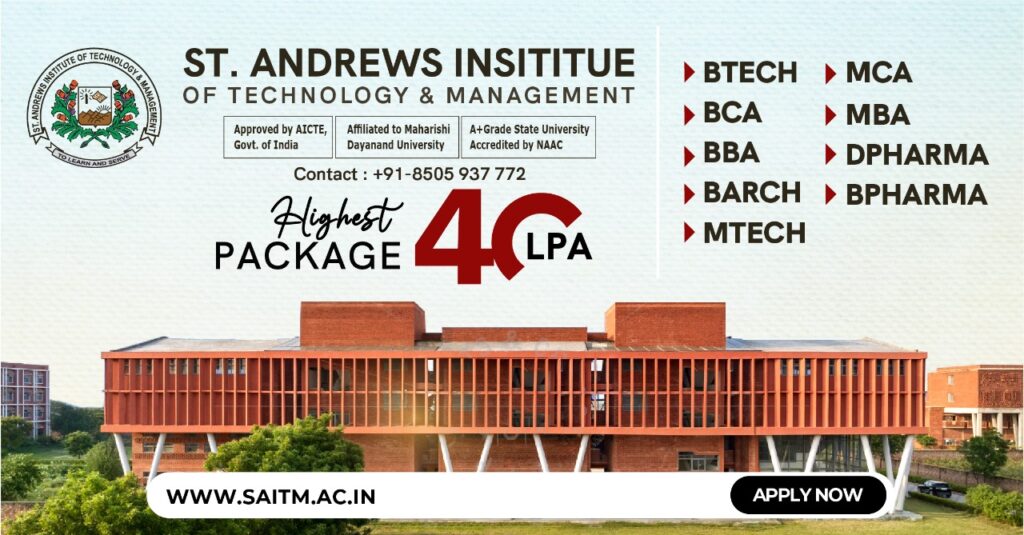List of MBA Courses With Details
MBA courses provide a core curriculum focusing on essential business management principles. The MBA Courses List and Details also include elective options, allowing students to tailor their education to their specific interests.

Image – 1 SAITM Management Block
Here’s a general list of common MBA courses along with a brief description of each:
Accounting for Managers
This course introduces accounting principles, focusing on how managers use accounting data for decision-making, planning, and financial reporting.
Business Analytics
Teaches the techniques and tools of data analysis and decision-making models, including statistics, optimization, risk analysis, and forecasting methods.
Corporate Finance
Covers the principles of financial analysis, planning, and control, with a focus on capital budgeting, capital structure, and working capital management.
Marketing Management
Focuses on the strategies and techniques for marketing products and services, including market research, consumer behaviour, and brand management.
Operations Management
Examines the processes involved in manufacturing and services, including productivity analysis, quality management, and supply chain logistics.
Organizational Behaviour
Studies human behaviour in organizational settings, the interface between human behaviour and the organization, and the organization itself.
Strategic Management
Provides a comprehensive examination of strategic decision-making processes, including competitive analysis, strategy formulation, and implementation.
Global Business Management
Discusses the strategies and management practices within the global business environment, focusing on the challenges of managing across borders.
Managerial Economics
Applies microeconomic theories to decision-making in business, including the forces of supply and demand, pricing strategies, and market competition.
Leadership
Explores various leadership theories and practices, focusing on developing leadership skills and understanding the dynamics of leadership in organizational settings.
Human Resources Management
Focuses on the management of people in organizations, including recruitment, selection, performance appraisal, and compensation.
Ethics and Corporate Responsibility
Examines ethical issues in business, including corporate governance, corporate social responsibility, and ethical decision-making.
Entrepreneurship
Encourages the development of business plans for new ventures, covering aspects of innovation, venture financing, and start-up strategies.
Information Technology Management
Focuses on the role of IT in business operations, including systems design, data management, and the strategic use of IT resources.
Some of the most opted courses in India and St. Andrews college or different Engineering college or Management colleges are as follows:-
- Btech
- Btech CSE
- Btech ETCE
- MTech
- BCA
- BBA
- MBA
- MCA
- DPharma – St. Andrews College of Pharmacy
- BPharma – St. Andrews College of Pharmacy
- BArch – St. Andrews College of Architecture
Different Types of MBA Programs

Image – 2 SAITM Dining Hall
MBA courses list and detail a wide variety of structures and focal points, tailored to accommodate different career objectives, schedules, and degrees of professional experience.
Here are the different types of MBA courses you might encounter:
Full-Time MBA
The traditional MBA format, usually lasting two years. Students typically leave their jobs and focus entirely on their studies, which allows for internships and extensive networking opportunities.
Part-Time MBA
Designed for working professionals who wish to continue working while studying. Classes are often held in the evenings or on weekends. This program can take longer to complete, usually 3-4 years.
Executive MBA (EMBA)
MBA courses list and detail Executive MBA programs, which are tailored for mid-to-senior level professionals possessing extensive work experience, typically a decade or more. These programs focus on leadership and strategic management, aiding executives in ascending to top corporate positions or refining their managerial skills. Classes are often scheduled for weekends or in intensive sessions to accommodate busy professionals.
Online MBA
Offers flexibility to complete the MBA remotely, which is ideal for those who need to balance work, study, and personal commitments. Technology allows for interactive learning experiences and remote collaboration with peers and faculty.
Global MBA
MBA courses list and detail programs that focus on international business, often including periods of study at overseas campuses or with international partner institutions. These programs are designed for individuals aiming for careers in global management or those who will engage with international markets, providing the necessary skills and exposure to thrive in a global business environment.
Accelerated MBA
A more intensive program designed to be completed in a shorter period, often around 12-18 months. This is suited for individuals looking to quickly return to the workforce with enhanced skills and knowledge.
Dual Degree MBA
Combines an MBA with another graduate degree, such as a JD (law degree), MD (medical degree), MPP (Master of Public Policy), or MS (Master of Science in a field like engineering or healthcare). This is ideal for those seeking to combine business expertise with specialized professional skills.
Specialty MBAs
These programs focus on specific industries or sectors such as Healthcare Management, Technology Management, or Sustainable Business. They provide in-depth knowledge relevant to particular fields.
MBA Courses: Eligibility Criteria

Image – 3 Best Management College Award
The eligibility criteria for MBA courses can vary widely depending on the program and the institution offering it.
However, there are some common requirements that most MBA courses will expect applicants to meet:
Bachelor’s Degree
Applicants typically must hold a bachelor’s degree from an accredited university or college. The degree does not necessarily have to be in a business-related field, as MBA courses often seek a diverse cohort from various academic backgrounds.
Work Experience
While not always mandatory, many MBA courses, especially Executive MBAs, require a certain amount of professional work experience. Full-time programs might prefer at least two years of work experience, whereas Executive MBAs usually require five to ten years, with some candidates possessing even more.
Entrance Exams
Many MBA courses require scores from the CAT (Common Admission Test), CMAT (Common Management Admission Test) and MAT (Management Aptitude Test).These tests assess analytical writing, quantitative, verbal, and reading skills in standardized formats. Some programs may waive this requirement for applicants with significant work experience or advanced professional credentials.
English Proficiency
For non-native English speakers, proficiency in English is generally required. This is usually demonstrated through scores from tests like TOEFL (Test of English as a Foreign Language) or IELTS (International English Language Testing System), especially in English-speaking countries or programs taught in English.
Professional References or Letters of Recommendation
Applicants might need to provide references or letters of recommendation from employers or academic advisors who can vouch for their professional abilities and potential for success in an MBA program.
Personal Statements and Essays
MBA courses list and detail application requirements that often include the submission of personal statements or essays. These writings are utilized by admissions committees to evaluate an applicant’s motivation, career aspirations, and the alignment between the candidate’s goals and what the program offers, aiding in the assessment of potential students.
Interviews
Some programs also include interviews in the admission process. These can be conducted in person or virtually and are a way for the admissions team to get a sense of the applicant’s interpersonal and communication skills, leadership potential, and overall suitability for the program.
Application Fee
A non-refundable application fee is typically required when you submit your application.
MBA Degree

Image – 4 SAITM Management IT LAB
An MBA (Master of Business Administration) degree is a graduate-level program that provides theoretical and practical training to help individuals gain a better understanding and management of business operations.
The MBA degree, highly valued in the global business environment, is designed to develop essential skills for careers in business and management, especially in leadership and managerial roles. MBA courses list and detail comprehensive curricula that encompass a broad range of topics aimed at enhancing these competencies. Here’s a detailed overview of what an MBA degree entails:
Purpose and Goals
The primary goal of an MBA is to equip students with a broad set of business skills across accounting, finance, marketing, HR, and operations in a manner that can be applied practically in any management role. The degree also aims to:
- Develop critical thinking and problem-solving skills.
- Enhance leadership and interpersonal skills necessary for managing teams and projects.
- Foster strategic thinking for making high-level decisions.
- Encourage innovation and entrepreneurial thinking.
- Improve communication skills for a diverse workplace.
Program Structure
MBA courses list and detail programs that typically span one to two years when pursued full-time. For working professionals, part-time and Executive MBA (EMBA) options are also available, which extend the duration to accommodate more flexible schedules. The structure of these programs often includes various modules and coursework designed to enhance business and management skills.
- Core Courses: These provide a foundation in essential business principles such as economics, marketing, finance, and operations management.
- Elective Courses: These allow students to specialize in areas such as digital marketing, international business, healthcare management, or technology management.
- Capstone Projects: These are practical projects that integrate all learned skills towards solving real-world business issues.
- Internships: Some programs require students to complete internships, providing hands-on experience and networking opportunities.
MBA Specialisations
MBA courses list and detail specializations across a wide array of fields such as Finance, Marketing, Operations Management, Information Systems, and Human Resource Management (HRM) to meet diverse career aspirations and industry demands. These specialized tracks provide students with the opportunity to explore in-depth their chosen areas of interest.
Learning Modes
- Full-time MBA: Intensive, typically two years, and involves a significant commitment. Ideal for recent graduates or early-career professionals.
- Part-time MBA: Designed for working professionals, classes are often held on evenings or weekends.
- Executive MBA (EMBA): For mid-to-senior-level professionals, focusing on advanced management and leadership skills.
- Online MBA: Offers flexibility for students to complete coursework online. Suitable for those who need a flexible schedule due to personal or professional commitments.
Admission Requirements
- Bachelor’s Degree: From an accredited university in any field.
- Work Experience: Especially for EMBA programs.
- Entrance Exams: Such as the GMAT or GRE. Some programs may accept CAT, XAT, or other standardized tests depending on the region.
- Application Elements: Including essays, professional resumes, and recommendations.
Career Outcomes
Graduates with an MBA can pursue various career paths in virtually every industry. Common roles include management consultant, business operations manager, financial analyst, marketing manager, and many executive positions like CEO or CFO. An MBA not only potentially increases salary prospects but also opens opportunities for greater responsibilities and career advancement.
Top Specialisations in MBA Courses

Image – 5 Highest Package
MBA courses offer a variety of specializations that allow students to focus on specific areas of interest within the broad field of business management.
Here are some of the top specializations in MBA courses that are particularly popular due to their career prospects and relevance in today’s economic environment:
Finance
MBA courses list and detail specializations in Finance, preparing students for careers in corporate finance, investment banking, financial planning, and asset management. This track covers essential topics such as financial markets, corporate finance, portfolio management, and financial derivatives, equipping students with the necessary skills for success in financial roles.
Marketing
Focuses on strategies for understanding customer behavior, developing effective marketing campaigns, and enhancing brand awareness. Courses might include digital marketing, consumer behaviour, sales management, and international marketing.
Operations Management:
Suited for individuals keen on logistics, manufacturing, and supply chain operations, this specialization focuses on optimizing production and product distribution. It encompasses studies on process analysis, supply chain strategy, and project management.
Human Resources Management (HRM)
Focuses on acquiring, developing, and retaining talent to ensure that an organization can achieve its goals. Topics include organizational behaviour, strategic HRM, labor relations, and performance management.
Information Technology (IT) Management
Prepares students to oversee IT-related aspects of businesses. Courses might cover topics like information systems management, software development, and data analytics.
International Business
For students interested in working abroad or in global firms, this specialization deals with managing multinational enterprises, international trade and finance, and cultural differences in business practices.
Entrepreneurship:
Designed for those who aspire to start their own business or enhance their family business. This specialization focuses on new venture creation, entrepreneurial finance, and innovation management.
Consulting
Prepares students for roles in management consulting firms, focusing on problem-solving, strategic planning, and organizational change management.
Healthcare Management
For those interested in the management of hospitals, clinics, and other healthcare settings. It covers healthcare policy, ethics in healthcare, and healthcare informatics.
Sustainability and Green Business
Focuses on environmental management, sustainable business practices, and corporate social responsibility. This is increasingly popular as companies focus more on their environmental impact.
Real Estate
Specializes in property development, real estate finance, and urban planning. It is ideal for those looking to manage real estate portfolios or work in urban development projects.
Supply Chain Management
Focuses on optimizing aspects of the supply chain from manufacturer to consumer. This specialization includes courses on logistics, procurement, and inventory management.
MBA Courses Syllabus

Image – 6 Management Students International(DUBAI) Industrial Visit
The syllabus for an MBA course can vary significantly from one institution to another, but most programs are designed to cover core business principles in the first year, followed by more specialized subjects in the second year, depending on the student’s chosen specialization.
Below is a typical MBA course syllabus, covering both core courses and examples of electives:
Semester 1: Core Foundations
Financial Accounting: Introduction to accounting principles, preparation and analysis of financial statements.
Managerial Economics: Economic theory applied to business practice, focusing on microeconomic factors affecting business decisions.
Quantitative Methods for Business: Basic statistics and probability for business decision-making, including an introduction to data analysis techniques.
Organizational Behaviour: Study of individual and group behaviour in organizational settings, including motivation, leadership, and organizational culture.
Semester 2: Core Expansions
Marketing Management: Fundamental concepts in marketing including strategy, segmentation, targeting, positioning, and the 4Ps.
Corporate Finance: Introduction to financial theory and corporate finance practices including investment analysis, capital structure, and working capital management.
Operations Management: Overview of production and service operations, focusing on efficiency, quality control, and supply chain management.
Business Communication: Developing effective communication skills, with an emphasis on writing and presentation skills in a business context.
Semester 3: Advanced Core and Specializations Begin
Strategic Management: Strategic analysis, planning, and implementation in competitive and global environments.
Business Ethics and Corporate Social Responsibility: Ethical decision-making in business, including the study of corporate governance and ethical responsibilities.
Elective 1: Depending on the student’s area of interest, options might include Advanced Financial Management, Consumer Behaviour, or IT Systems Management.
Elective 2: Options might continue with personal specialization interests such as Digital Marketing, Human Resource Management, or Real Estate Finance.
Semester 4: Capstone and Further Specialization
Capstone Project: Integration of learned concepts through a strategic project or consulting assignment with real businesses.
International Business Management: Examines global trade theories, international markets, and operational strategies of multinational corporations.
Elective 3: Further specialization electives, which might include Investment Banking, Strategic HR Management, or Supply Chain Analytics.
Elective 4: Continuation or completion of specialization tracks, possible courses could be Entrepreneurship, Advanced Operations Strategy, or Health Care Policy.
Additional Components
Leadership Labs and Workshops: Throughout the program, there might be workshops or labs focused on developing leadership and teamwork skills.
Internship: Often between the first and second year, an internship that provides practical industry experience is highly encouraged or required.
Integrative Learning
Many MBA courses emphasize integrative learning experiences, where lessons from various courses are applied in practical, often team-based projects. These can be spread across all semesters, enhancing the real-world applicability of the coursework.
MBA in General Management

Image – 7 Online Digital Marketing Workshop
An MBA in General Management is designed to equip students with a comprehensive understanding of various business disciplines. This program is particularly suitable for those looking to assume leadership roles or manage cross-functional teams. Here’s an overview of what an MBA in General Management typically involves:
Objective
The primary objective of an MBA in General Management is to develop well-rounded business leaders capable of managing complex business issues across various domains. It prepares students to think strategically, lead diverse teams, and make decisions that impact the business on multiple levels.
Curriculum
The curriculum in a General Management program covers a broad range of subjects to provide a holistic view of business operations. Key areas of focus include:
Strategic Management: Understanding how to analyze, formulate, and implement strategies within an organization.
Marketing: Studying market research, consumer behavior, digital marketing, and management of marketing strategies.
Financial Management: Gaining insights into financial reporting, corporate finance, investment banking, and financial analysis.
Operations Management: Delving into production planning, project management, logistics, and supply chain operations.
HRM: Covering aspects such as talent acquisition, employee retention, performance management, and leadership.
Information Systems: Understanding the strategic use of information technology in business operations.
Global Business Management: Learning how international markets work, global supply chain management, and cross-cultural management.
Course Structure
An MBA in General Management typically follows a two-year full-time format, though many institutions also offer part-time and executive options to accommodate working professionals. The first year generally focuses on core courses that build foundational skills, while the second year offers elective courses allowing for more specialized learning in areas of interest.
Skills Developed
The program aims to develop critical skills that include:
Analytical Thinking: Ability to break down complex problems and devise effective solutions.
Leadership: Skills in leading teams, motivating staff, and managing organizational change.
Strategic Planning: Long-term planning abilities to steer the company towards sustained growth.
Communication: Strong verbal and written communication skills essential for leadership roles.
Ethical Judgment and Decision-Making: Understanding and implementing ethical business practices.
Career Opportunities
Graduates with an MBA in General Management are well-prepared for a variety of roles, including:
- General Manager
- Operations Manager
- Strategic Planner
- Business Consultant
- Entrepreneur
- Human Resources Manager
Ideal Candidates
This MBA is ideal for:
- Individuals aiming for leadership roles across different sectors.
- Professionals in specialized roles seeking broader management skills.
- Entrepreneurs who need a robust foundation in managing a business.
- Those looking to accelerate their career progression into senior management roles.
MBA Human Resource Management (HRM)

Image – 8 Best Engineering College Award
An MBA in Human Resource Management (HRM) is a specialized graduate program designed to prepare students for senior roles in HR and people management. This program focuses on developing skills needed to manage an organization’s most valuable assets—its people. Here’s a comprehensive look at what an MBA in HRM typically involves:
Objective:
The primary goal of an MBA in HRM (Human Resource Management) is to equip students with advanced knowledge and skills in managing workforce dynamics in various organizational settings. It prepares graduates to effectively handle issues such as recruitment, training and development, performance management, and employee relations.
Curriculum:
The curriculum of an MBA in HRM combines core business management courses with specialized HR subjects.
Here are some of the key courses typically included:
Organizational Behaviour: Studies how people behave within groups and organizations, and how this can be managed effectively.
Strategic HR Management: Focuses on aligning the HR strategy with the overall business strategy to improve productivity and organizational culture.
Talent Management: Covers strategies for talent acquisition, retention, development, and succession planning.
Compensation and Benefits: Teaches how to design and manage employee compensation packages, including salaries, benefits, bonuses, and other types of remuneration.
Labor Relations: Deals with managing relationships between the workforce and the management, including negotiation and administration of labor contracts.
Employment Law: Provides an understanding of the legal aspects of employment, including regulations related to hiring, workplace safety, discrimination, and termination.
Performance Management: Focuses on the methodologies and tools for assessing and improving employee performance.
Human Resources Information Systems (HRIS): Teaches about the technological systems used to manage employee information and HR processes.
Global HR Management: Covers the challenges and strategies involved in managing a global workforce, including cultural, legal, and economic differences.
Skills Developed:
The program aims to develop several critical skills:
Interpersonal and Communication Skills: Vital for dealing effectively with people at all organizational levels.
Strategic Thinking: Ability to align HR strategies with overall business objectives.
Analytical Skills: Necessary for data-driven decision-making regarding workforce planning and management.
Leadership and Ethical Judgment: Essential for leading HR teams and making decisions that affect employee welfare and organizational integrity.
Career Opportunities:
Graduates can pursue a range of HR-related roles, including:
- HR Manager
- Talent Acquisition Specialist
- Training and Development Manager
- HR Consultant
- Employee Relations Manager
- Compensation and Benefits Manager
- HR Analytics Specialist
- Chief Human Resources Officer (CHRO)
Ideal Candidates:
This MBA course is suited for:
- Individuals interested in a career focused on managing people.
- Existing HR professionals aiming for higher managerial or strategic roles.
- Leaders in other domains looking to switch to HRM.
MBA in Marketing Management

Image – 9 Courses Overview
An MBA degree in Marketing Management is a specialized program that focuses on the art and science of market analysis, creating and managing marketing strategies, and leading sales teams. This MBA specialization is designed to equip students with the advanced knowledge and tools they need to lead in the marketing sector, whether in a large corporation, a small business, or an entrepreneurial venture.
Objective–
The primary objective of an MBA in Marketing Management is to develop the strategic thinking and creative skills required to manage successful marketing campaigns. The program emphasizes understanding consumer behaviour, market research, digital marketing strategies, and global marketing trends.
Curriculum–
The curriculum of an MBA in Marketing Management usually includes a combination of core business management courses and specialized marketing courses. Typical courses might include:
Consumer Behaviour: Understanding the psychological, social, and emotional factors that influence consumer purchasing decisions.
Marketing Research: Techniques for gathering, analyzing, and interpreting data about markets to make informed marketing decisions.
Digital Marketing: Strategies for using digital channels to market products and services, including SEO, social media marketing, and email marketing.
Brand Management: Techniques for building, managing, and positioning brand assets to create value for the organization.
Sales Force Management: Strategies for managing sales operations, including training, motivating, and leading sales teams.
International Marketing: Examining global market trends and strategies for entering and succeeding in foreign markets.
Integrated Marketing Communications: Strategies to ensure consistency of message across all marketing mediums and channels.
Product Management: Lifecycle management of a product, from concept through development, launch, and decline.
Skills Developed–
Graduates of an MBA in Marketing Management will develop:
Strategic Thinking and Planning Skills: Ability to devise comprehensive marketing strategies that align with business goals.
Analytical Skills: Proficiency in analyzing market data and consumer insights to inform decision-making.
Creativity and Innovation: Skills in creating unique marketing campaigns and solving marketing problems creatively.
Communication Skills: Strong verbal and written communication skills crucial for pitching ideas and persuading customers.
Leadership Skills: Capability to lead and manage marketing teams and projects effectively.
Career Opportunities–
An MBA in Marketing Management can open doors to a variety of career paths in the marketing field, including:
- Marketing Manager
- Brand Manager
- Sales Manager
- Market Research Analyst
- Product Manager
- Digital Marketing Manager
- Advertising Manager
- Chief Marketing Officer (CMO)
Ideal Candidates–
This program is ideally suited for:
Individuals with a strong interest in understanding consumer psychology and market dynamics.
Professionals currently working in marketing who wish to advance their careers to a managerial or strategic level.
Entrepreneurs who need to develop comprehensive marketing strategies for their businesses.
MBA in Information Technology

Image – 10 Management Students Presentation Day
An MBA in Information Technology (IT) Management is designed to bridge the gap between complex technological issues and strategic business administration. The program equips students with the skills to understand and manage the IT needs of businesses effectively, combining traditional MBA content with specialized knowledge in IT management.
Objective:-
The primary goal of an MBA in IT Management is to prepare students to become leaders in the IT industry, capable of managing technology-driven businesses or technology departments within larger companies. The program focuses on aligning IT strategies with business strategies, managing IT infrastructure and projects, and understanding emerging technologies in a business context.
Curriculum :
The curriculum for an MBA in IT Management typically includes a blend of core business courses and specialized IT courses. Key subjects might include:
Management Information Systems: Understanding the role of IT in organizations and how it supports, enhances, and sometimes transforms business operations.
Database Management: Techniques for database design, development, and management to ensure the integrity and security of data resources.
Software Project Management: Strategies for planning, executing, and controlling software projects, including agile methodologies.
IT Security and Risk Management: Understanding the critical aspects of IT security and how to manage risks associated with IT assets.
Business Data Analytics: Using data analysis tools and methodologies to make data-driven business decisions.
E-Business/E-Commerce: Exploring how internet technologies influence business models and strategies.
Cloud Computing: Insights into cloud services, deployment models, and their strategic implications in business.
Emerging Technologies: Examining the impact of new technologies like artificial intelligence, blockchain, and the Internet of Things (IoT) on business strategies.
Skills Developed—
Students will develop a broad range of skills, including:
Strategic Thinking: Aligning IT strategies with business goals to drive organizational success.
Leadership and Management: Leading IT teams and projects, understanding organizational behaviour, and managing change.
Analytical Skills: Analyzing complex data to inform business and IT decisions.
Technical Knowledge: Understanding critical IT operations, infrastructure management, and technology procurement.
Problem Solving: Addressing and solving technological challenges within a business context.
Career Opportunities—
Graduates with an MBA in IT Management can pursue a variety of roles, such as:
- IT Manager/Director
- Chief Information Officer (CIO)
- Technology Consultant
- Project Manager
- Systems Analyst
- Business Analyst
- IT Strategy and Planning Manager
- Data Analytics Manager
Ideal Candidates—
This program is ideal for:
Professionals who currently work in IT and wish to move into management roles.
Managers in other fields who want to switch to IT.
Business leaders who need to oversee IT departments.
Entrepreneurs who want to leverage technology effectively in new ventures.
MBA International Business

Image -11 New Management Block
An MBA in International Business is designed to prepare students to manage and lead organizations across global markets. This specialized MBA course equips learners with the skills needed to understand and navigate the complex world of international trade, cultural differences, and global economic environments. It’s particularly valuable for those looking to establish or accelerate a career in international management or global business.
Objective-:
The primary goal of this MBA course is to develop the strategic thinking and managerial skills required to successfully conduct business across international borders. Students gain an understanding of global business practices and are trained to handle the challenges and opportunities associated with operating in a global marketplace.
Curriculum –
The curriculum for an MBA in International Business covers a wide range of topics that blend core business administration principles with specialized knowledge in international trade and operations. Key courses typically include:
Global Marketing Management: Strategies for entering foreign markets, understanding international consumer behavior, and managing global marketing campaigns.
International Trade and Finance: Understanding the economic theories behind trade, international finance systems, and exchange rate dynamics.
Cross-Cultural Management: Learning how to manage across cultural boundaries, including strategies for communication, negotiation, and leadership in diverse cultural contexts.
Global Operations and Supply Chain Management: Managing international supply chains, including logistics, procurement, and compliance with local and international regulations.
International Business Law: Overview of the legal aspects of international business, including trade laws, intellectual property rights, and labor laws across different jurisdictions.
Global Business Strategy: Development and execution of business strategies in a global context, including market entry strategies and competitive analysis.
Emerging Markets: Focus on the dynamics of doing business in emerging markets, understanding the risks and opportunities in these regions.
Skills Developed:-
Graduates of an MBA in International Business program will develop:
Global Awareness: Understanding of global economic environments and sensitivity to cultural differences.
Strategic Thinking: Ability to formulate and implement strategies that accommodate various international contexts.
Leadership Skills: Leadership and management skills that are effective across different cultural environments.
Negotiation and Communication Skills: Enhanced ability to negotiate and communicate effectively in a diverse international setting.
Analytical Skills: Strong analytical skills for assessing international market opportunities and risks.
Career Opportunities:-
An MBA in International Business opens up numerous career paths, including:
- International Business Consultant
- Global Supply Chain Manager
- Export and Import Management
- International Marketing Director
- Business Development Manager
- Foreign Policy Advisor
- Multinational Manager
- Diplomatic Services
Ideal Candidates:-
This program is ideal for:
Professionals who aim to work in multinational corporations or manage business operations across different countries.
Entrepreneurs who plan to operate their businesses on a global scale.
Individuals with a strong interest in understanding global market dynamics and international trade.
MBA Financial Management

Image -12 Project Exhibition at SAITM Campus
An MBA in Financial Management is a specialized business degree that equips students with advanced skills in financial analysis, investment management, corporate finance, and financial strategy. This program is designed for those seeking to excel in the finance sector, whether in corporate finance, investment banking, financial planning, or other areas of financial services.
Objective :-
knowledge and skills needed to make well-informed and impactful financial decisions across diverse business settings. MBA courses list and detail how this program integrates rigorous financial theory with practical applications to foster strategic thinking and enhance managerial skills in finance.
Through a comprehensive curriculum, students gain a deep understanding of financial concepts and techniques, enabling them to excel in roles requiring financial acumen and decision-making prowess
Curriculum—
The curriculum for an MBA in Financial Management typically encompasses a mix of fundamental business administration courses alongside specialized finance subjects. Key elements of the program may include:
Corporate Finance: Understanding the principles of financial management at a corporate level, including capital structure, risk management, and budgeting.
Investment Analysis and Portfolio Management: Techniques for assessing investment opportunities and managing portfolios, including understanding market dynamics and financial instruments.
Financial Markets and Institutions: Insight into the structure, types, and functions of financial markets and institutions.
Financial Accounting and Analysis: Deep dive into financial accounting principles, and the analysis of financial statements to evaluate company performance.
Quantitative Analysis for Financial Management: Application of quantitative methods to solve financial problems, including statistics and econometrics.
Risk Management: Strategies for identifying, analyzing, and mitigating financial risks.
International Finance: Exploring financial management in an international context, including foreign exchange risk, cross-border investment decisions, and international financial markets.
Mergers and Acquisitions: Understanding the strategic, financial, and regulatory considerations involved in corporate restructuring.
Skills Developed:–
Students will develop a comprehensive skill set that includes:
Analytical Skills: Ability to analyze complex financial statements and market data to make informed decisions.
Strategic Thinking: Skills in planning long-term financial strategies that align with organizational goals.
Problem-Solving Skills: Aptitude for identifying and solving financial issues within an organization.
Leadership and Communication Skills: Ability to lead financial teams and effectively communicate financial strategies and outcomes to stakeholders.
Technical Proficiency: Knowledge of advanced financial tools and software.
Career Opportunities:–
Graduates with an MBA in Financial Management can pursue various career paths, including:
- Financial Analyst
- Investment Banker
- Financial Manager or Director
- Chief Financial Officer (CFO)
- Portfolio Manager
- Risk Manager
- Corporate Controller
- Treasurer
Ideal Candidates:–
This program is well-suited for:
Professionals currently working in finance who want to advance their careers to managerial or executive positions.
Individuals from non-finance backgrounds who wish to switch to a finance-focused career.
Entrepreneurs who need to manage the financial aspects of their businesses more effectively.
MBA in Business Analytics

Image -13 Inside View of SAITM Campus
An MBA specialization in Business Analytics is tailored for individuals aiming to integrate business knowledge with data-driven decision-making skills. This specialized program focuses on equipping students with the ability to leverage, analyze, and interpret data to derive strategic business insights.
MBA courses list and detail how this program is specifically designed to meet the needs of professionals seeking to utilize data in managerial and leadership roles across various sectors.
It offers a comprehensive curriculum aimed at developing proficiency in data analytics and its application in driving organizational success.
Objective—
The primary aim of an MBA course in Business Analytics is to equip students with the skills to emerge as leaders capable of leveraging analytical tools and methodologies to address business challenges, enhance operational efficiencies, and seize emerging opportunities.
MBA courses list and detail how this program is structured to combine conventional business acumen with advanced analytical techniques.
Through a comprehensive curriculum, students gain the expertise needed to apply data-driven insights effectively in decision-making processes, driving innovation and success in today’s competitive business landscape.
Curriculum —
The curriculum of an MBA in Business Analytics intertwines fundamental business modules with focused analytics instruction. Common courses might encompass:
Data Science and Business Analytics: Introduction to data science techniques, including statistical analysis, predictive modeling, and data visualization.
Big Data Technologies: Overview of the technologies used to store, process, and analyze large sets of data, such as Hadoop, Spark, and NoSQL databases.
Quantitative Methods: Advanced statistical and quantitative techniques used for decision-making in business contexts.
Machine Learning for Business: Applying machine learning algorithms to solve real-world business problems, such as customer segmentation and demand forecasting.
Business Intelligence: Tools and techniques for transforming data into actionable business insights, focusing on dashboarding and reporting technologies.
Data-Driven Decision Making: Methodologies for making strategic business decisions based on data analysis.
Marketing Analytics: Techniques for analyzing and optimizing marketing strategies and campaigns.
Financial Analytics: Utilization of analytical tools on financial data to aid investment decisions, risk assessment, and financial planning.
Skills Developed :-
Graduates of this MBA specialization develop a range of skills that include:
Analytical Thinking: Ability to dissect complex data sets to identify patterns, trends, and insights.
Strategic Decision-Making: Using data to inform strategies and make business decisions that drive growth and efficiency.
Technical Proficiency: Proficiency in analytics software and tools, such as SQL, Python, R, SAS, and Tableau.
Communication Skills: Ability to translate complex data insights into understandable and actionable business strategies.
Problem-Solving Skills: Aptitude for approaching business challenges with data-driven solutions.
Career Opportunities :-
An MBA in Business Analytics opens up various career opportunities in fields such as:
- Business Analyst
- Data Analyst
- Analytics Manager
- Chief Data Officer
- Consultant in Analytics
- Operations Analyst
- Marketing Analytics Manager
- Supply Chain Analyst
Ideal Candidates :-
This program is ideal for:
Professionals who already work with data but want to enhance their analytical skills within a business context.
Managers and executives who aim to base their strategic decisions on data-driven insights.
Individuals from any industry who wish to transition into analytics roles.
MBA in Business Management

Image – 14 Degree Distribution at SAITM Campus
An MBA in Business Management is one of the most comprehensive and versatile graduate degrees in the field of business. This program is designed to provide a broad understanding of the various aspects of business operations and to develop skills essential for effective leadership and management in a variety of organizational settings.
Objective —
The primary goal of an MBA specialisation in Business Management is to furnish students with both fundamental and advanced expertise in business administration, encompassing insights into organizational behavior, strategic management, and decision-making protocols. This program strives to ready graduates for leadership positions and proficiently address intricate business dilemmas.
Curriculum:-
The curriculum for an MBA in Business Management covers a wide range of topics, providing a holistic understanding of business. Key courses typically include:
Organizational Behaviour: Exploring how individuals and groups behave within organizations and how leaders can effectively manage these dynamics.
Strategic Management: Teaching the formulation and implementation of business strategies to achieve organizational goals.
Financial Management: Understanding corporate finance, investment decisions, and financial analysis to manage the financial health of an organization.
Marketing Management: Covering market research, consumer behavior, and strategic marketing to enhance product and service offerings.
Operations Management: Focusing on the processes that produce and deliver goods and services, including supply chain management and quality control.
Human Resource Management: Managing employee relations, performance, development, and strategic HR planning.
Business Ethics and Corporate Social Responsibility: Discussing ethical practices in business and the impact of corporate actions on society and the environment.
Global Business Management: Navigating the complexities of operating in international markets, including understanding global trade dynamics and cross-cultural management.
Skills Developed :–
Students will develop a comprehensive set of skills that include:
Leadership: Ability to lead and manage people effectively in various organizational contexts.
Strategic Thinking: Skills in analyzing complex situations, making strategic decisions, and foreseeing potential impacts on the business.
Problem-Solving: Aptitude for identifying problems and devising effective solutions quickly and efficiently.
Communication: Strong interpersonal and communication skills essential for negotiating, persuading, and leading diverse teams.
Analytical Thinking: Proficiency in analyzing data to inform business decisions and improve operational efficiencies.
Career Opportunities :–
Graduates with an MBA in Business Management have a wide range of career paths available, including:
- General Manager
- Business Consultant
- Operations Manager
- Entrepreneur
- Strategic Planner
- Project Manager
- Corporate Executive (e.g., CEO, CFO, CMO)
Ideal Candidates :–
This MBA course is suited for:
Individuals aspiring to leadership roles across various industries.
Professionals who want to enhance their management skills and advance their careers.
Entrepreneurs looking to develop a robust business acumen.
MBA Healthcare Management

Image -15 Sports Day Event
A Healthcare Management MBA specialization is a focused program designed to prepare students for leadership roles in the healthcare sector.
This specialized MBA integrates healthcare and business administration, aiming to equip graduates with vital competencies to effectively manage healthcare institutions and navigate the complex healthcare landscape.
MBA courses list and detail how this program provides a specialized curriculum tailored to meet the unique demands of the healthcare industry, ensuring students develop the skills and knowledge needed for success in leadership positions within this dynamic field.
Objective :–
The primary goal of an MBA course in Healthcare Management is to cultivate proficient professionals capable of effectively leading healthcare organizations.
MBA courses list and detail how this program aims to achieve this objective by providing students with a comprehensive understanding of healthcare policies, economic factors, and management practices that shape the delivery of healthcare services.
Through rigorous coursework and practical experiences, students develop the expertise needed to navigate the complexities of the healthcare industry and drive positive organizational outcomes.
Curriculum :-
The curriculum typically combines core MBA subjects with specialized courses that focus on healthcare management. Common courses in an MBA Healthcare Management program include:
Exploring Healthcare Systems and Policies: Overview of various healthcare systems globally, understanding public health policies, and their impact on healthcare management.
Healthcare Finance: Specialized financial management principles applied to healthcare, including budgeting, financial analysis, and reimbursement methods.
Optimizing Healthcare Operations Management: Techniques for improving efficiency in healthcare delivery, including patient flow management, service delivery, and quality control.
Medical Ethics and Law: Focus on the legal and ethical issues unique to the healthcare industry, such as patient rights, medical malpractice, and regulatory compliance.
Health Informatics: Use of information technology to manage health information and electronic health records (EHRs).
Marketing in Healthcare: Strategies for marketing in the healthcare sector, focusing on patient engagement and community health promotion.
Leadership in Healthcare: Development of leadership skills specific to healthcare settings, emphasizing organizational change and team management.
Skills Developed-:
Graduates from an MBA in Healthcare Management program typically develop:
Analytical Skills: Ability to analyze healthcare data and financial reports to make informed management decisions.
Strategic Planning: Skills in developing long-term strategies that align with healthcare advancements and regulatory changes.
Leadership and Ethical Decision-Making: Leading teams effectively while adhering to ethical considerations in healthcare.
Operational Efficiency: Understanding of how to optimize healthcare operations to improve patient care and reduce costs.
Communication Skills: Effective communication with diverse stakeholders including medical staff, patients, and regulatory bodies.
Career Opportunities-:
An MBA in Healthcare Management can open up numerous career paths in various settings within the healthcare industry, such as:
- Hospital Administrator
- Healthcare Consultant
- Practice Manager for Physician Groups
- Health Services Manager
- Healthcare Finance Manager
- Policy Analyst
- Pharmaceutical Project Manager
- Quality and Improvement Manager
Ideal Candidates-:
This program is ideal for:
Individuals currently working in the healthcare industry who wish to move into management roles.
Professionals in the business field who want to transition to the healthcare sector.
Anyone interested in the management of hospitals, healthcare clinics, or related healthcare organizations.
MBA in Logistics and Supply Chain Management

Image – 16 Courses Overview
An MBA course in Logistics and Supply Chain Management is a specialized business degree that concentrates on effectively managing resources, information, and goods throughout their journey from origin to consumption.
MBA courses list and detail how this program is tailored to equip students with the knowledge and skills needed for leadership positions in the logistics and supply chain sectors.
The curriculum focuses on enhancing understanding of global supply chains, logistics operations, and strategic supply chain management to prepare students for success in these dynamic industries.
Objective -:
The primary focus of this MBA course is to enhance the strategic and operational capabilities of students in managing complex supply chains.
MBA courses list and detail how this program is structured to equip students with essential skills to increase operational efficiencies, optimize logistics and supply chain processes, and foster innovation in the management of global supply chains.
Curriculum:–
The curriculum of an MBA in Logistics and Supply Chain Management generally combines core business management courses with specialized subjects related to supply chain and logistics.
Key courses might include:
Supply Chain Management: Understanding the end-to-end supply chain processes, including procurement, manufacturing, distribution, and the final delivery of products.
Logistics Management: Focused on the planning, implementation, and control of the forward and reverse flow and storage of goods, services, and related information.
Global Supply Chain Management: Examines the complexities of managing supply chains in a global context, including dealing with cross-border regulations, global sourcing, and international logistics.
Operations Strategy: Development and implementation of strategies to manage operations effectively within an organization.
Supply Chain Analytics: Utilizing data analytics to improve decision-making in supply chain management, including demand forecasting and inventory management.
Procurement and Purchasing Management: Strategies and practices for effective sourcing and procurement of materials and services.
Project Management: Principles and techniques for managing large-scale projects, including time, cost, and quality management.
Sustainable Supply Chain Management: Focus on developing eco-friendly supply chain practices and understanding the regulatory and environmental issues impacting supply chains.
Skills Developed–:
Graduates from this program typically develop:
Analytical Skills: Strong ability to analyze and interpret data to make informed supply chain decisions.
Problem Solving Skills: Capability to address and solve complex logistical and supply chain challenges.
Strategic Planning: Skills in planning and executing strategies that enhance supply chain efficiency and competitiveness.
Leadership Abilities: Leadership and management skills tailored to the contexts of logistics and supply chain operations.
Technical Proficiency: Understanding of the latest technologies and software used in supply chain and logistics management.
Career Opportunities -:
An MBA in Logistics and Supply Chain Management can lead to various career opportunities such as:
- Supply Chain Manager
- Logistics Manager
- Operations Director
- Procurement Manager
- Inventory Control Manager
- Supply Chain Analyst
- Warehouse Operations Manager
- Distribution Center Manager
Ideal Candidates–:
This MBA course is well-suited for:
Professionals currently working in logistics, supply chain, or related fields who want to advance to managerial roles.
Individuals seeking a career change into logistics and supply chain sectors due to their dynamic nature and critical importance in global business environments.
Entrepreneurs interested in starting businesses that require effective supply chain management.
MBA Courses Career Scope: Jobs Profiles, Salary and Top Recruiters

Image -17 MBA Student placed as a Business Development Associates
An MBA degree significantly expands career prospects, opening up avenues to high-level management roles across various industries. MBA courses list and detail the potential job profiles, expected salary ranges, and top recruiters for MBA graduates.
These opportunities can vary widely based on specialization and geographic location, providing a comprehensive view of the potential career paths available to MBA holders.
Job Profiles
Depending on their specialization, MBA graduates can pursue various career paths.
Here are some common job profiles by specialization:
General Management: CEO, General Manager, Business Development Manager, Operations Manager.
Finance: Financial Analyst, Chief Financial Officer (CFO), Investment Banker, Financial Manager, Treasury Manager.
Marketing: Marketing Manager, Brand Manager, Sales Manager, Product Manager, Digital Marketing Manager.
HRM: HR Manager, Talent Acquisition Specialist, Compensation Manager, Organizational Development Consultant.
Operations and Logistics: Supply Chain Manager, Logistics Manager, Operations Director, Quality Assurance Manager.
Information Technology Management: IT Director, Chief Information Officer (CIO), Technology Manager, Systems Analyst.
Healthcare Management: Healthcare Administrator, Hospital CEO, Policy Analyst, Health Services Manager.
Consulting: Management Consultant, Strategy Consultant, Business Advisor, Operations Consultant.
Salary
Salaries for MBA graduates can vary widely depending on the industry, location, and level of experience. Here are some general guidelines:
Entry-Level: Starting salaries for MBA graduates in India, the range might start from approximately INR 7 lakh to INR 20 lakh per annum.
Mid-Level to Senior-Level: With more experience, MBA graduates can earn upwards of INR 20 lakh to INR 50 lakh and above in India.
Executive-Level: Executives like CEOs and CFOs can earn from several hundred thousand dollars to over a million annually, especially in large corporations or highly profitable sectors.
Top Recruiters
The range of top recruiters for MBA graduates is broad, spanning various sectors:
Consulting Firms: McKinsey & Company, Boston Consulting Group (BCG), Bain & Company, Deloitte, PwC, EY, KPMG.
Financial Institutions: Goldman Sachs, Morgan Stanley, J.P. Morgan, Citigroup, Bank of America Merrill Lynch, HSBC.
Technology Companies: Google, Apple, Microsoft, Amazon, Facebook, Oracle, IBM.
Consumer Goods Companies: Procter & Gamble, Unilever, Nestlé, L’Oréal, Coca-Cola, PepsiCo.
Healthcare Organizations: UnitedHealth Group, Pfizer, Johnson & Johnson, Merck, GSK.
Manufacturing and Automotive Companies: General Motors, Ford, Tesla, General Electric, Siemens.
Retail Corporations: Walmart, Target, IKEA, H&M.
Telecommunications: AT&T, Verizon, T-Mobile, Vodafone.
Career Advancement
An MBA not only enhances income potential but also paves the way for roles involving greater responsibility, such as leading larger teams or overseeing significant projects. MBA courses list and detail the skills developed during the program, such as leadership, strategic thinking, and analytical abilities. These skills are highly transferable and valued across various industries, facilitating career transitions and advancements more effectively.
Skills Required for MBA Courses

Image -18 SAITM Campus
To thrive in an MBA program and maximize the opportunities it provides, specific skills and qualities are essential. These competencies not only ease the academic journey but also prepare students for successful leadership and management roles after graduation.
MBA courses list and detail the key skills required, offering a comprehensive overview of the capabilities that enhance both educational and professional outcomes.
Analytical Thinking
- Problem Solving: Ability to identify problems, think critically, and develop logical solutions.
- Quantitative Analysis: Proficiency with numbers and data analysis, important for courses in finance, accounting, and statistics.
Strategic Thinking
- Long-term Planning: Developing strategies that foresee and address future business challenges and opportunities.
- Decision Making: Making informed decisions based on a thorough analysis of available data and potential outcomes.
Leadership:
- Team Management: Leading and motivating teams to achieve business goals, crucial for group projects and post-MBA roles.
- Conflict Resolution: Navigating and resolving disputes effectively, maintaining a productive working environment.
Communication
- Verbal and Written Communication: Articulating ideas clearly and persuasively in presentations and written assignments.
- Interpersonal Skills: Engaging with peers, professors, and professionals effectively, essential for networking and teamwork.
Adaptability
- Flexibility: Adjusting to the diverse and dynamic nature of business environments and MBA curriculums.
- Cultural Sensitivity: Working effectively in diverse international environments, understanding and respecting different cultural perspectives.
Organizational Skills
- Time Management: Balancing coursework, group projects, networking, and personal commitments efficiently.
- Project Management: Planning, executing, and managing projects to meet deadlines and achieve desired outcomes.
Ethical Judgment and Integrity
- Ethical Reasoning: Understanding and applying ethical considerations to business decisions.
- Honesty and Accountability: Upholding transparency and accountability in academic and professional settings.
Technological Proficiency
- Information Technology Skills: Familiarity with business software, tools, and platforms that facilitate data analysis, presentations, and remote collaboration.
- Adaptation to New Technologies: Keeping up with technological advancements and integrating them into business practices.
Entrepreneurial Spirit
- Innovation and Creativity: Thinking outside the box to generate unique solutions and business ideas.
- Risk Management: Assessing and managing risks associated with new ventures or business strategies.
Learning and Development
- Self-Motivation and Initiative: Taking charge of one’s learning and career development.
- Continuous Learning: Committing to ongoing personal and professional development beyond the MBA program.
Networking
- Building Relationships: Creating and maintaining professional relationships that can provide support, advice, and opportunities.
- Collaboration: Working cooperatively with others to achieve shared goals, essential for learning and success in business environments.
Top MBA Courses Entrance Exams in India

Image – 19 SAITM Boys Hostel
In India, admissions into MBA courses are facilitated through several entrance exams, which are a crucial part of the application process. These exams assess a variety of skills including quantitative ability, logical reasoning, language proficiency, and general awareness.
MBA courses list and detail the top entrance exams in India, providing an overview of each to help prospective students prepare effectively for these assessments.
1. CAT (Common Admission Test)
- Administered By: Indian Institutes of Management (IIMs)
- Purpose: Primary exam for admission into the IIMs and many other business schools across India.
- Format: Computer-based test covering Verbal Ability and Reading Comprehension, Data Interpretation and Logical Reasoning, and Quantitative Ability.
2. XAT (Xavier Aptitude Test)
- Administered By: XLRI, Jamshedpur
- Purpose: Used by XLRI and over 160 other institutes for admission into their management programs.
- Format: Includes sections on Decision Making, Verbal and Logical Ability, Quantitative Ability and Data Interpretation, and General Knowledge.
3. CMAT (Common Management Admission Test)
- Administered By: National Testing Agency (NTA)
- Purpose: Accepted by over 1000 institutes across India for admission into management programs.
- Format: Computer-based test covering Quantitative Technique, Logical Reasoning, Language Comprehension, and General Awareness.
4. MAT (Management Aptitude Test)
- Administered By: All India Management Association (AIMA)
- Purpose: Accepted by over 600 business schools across India.
- Format: Available in both paper-based and computer-based formats covering Language Comprehension, Mathematical Skills, Data Analysis and Sufficiency, Intelligence and Critical Reasoning, and Indian and Global Environment.
Preparation Tips
- Understand the Format: Each test has a unique format and scoring system. Understanding these can help tailor your preparation effectively.
- Practice Regularly: Solving previous years’ papers and taking mock tests can help build accuracy and speed.
- Time Management: Learn to manage time effectively during the test to ensure all sections are attempted.
Top Colleges for MBA Courses

Image -20 Inside View of Management Block
In India, several prestigious institutions offer top-tier MBA courses renowned for their academic rigor, extensive alumni networks, and strong industry connections. Here’s a list of some of the top MBA colleges in India:
1. Indian Institutes of Management (IIMs)
The IIMs are premier institutes in India offering postgraduate, doctoral, and executive programs in management with several campuses across the country.
2. Indian School of Business (ISB)
Located in Hyderabad and Mohali, ISB is renowned for its one-year Post Graduate Program (PGP) in Management, which attracts mid-career professionals from across the world.
3. St. Andrews Institute of Technology and Management (SAITM), Gurgaon
St. Andrews Institute of Technology and Management (SAITM) is offering MBA courses in India. Located in Gurgaon, Haryana, SAITM is known for providing quality education with an emphasis on real-world applications.
4. Faculty of Management Studies (FMS), University of Delhi
Known as the “Red Building of Dreams,” FMS offers high-quality management education with one of the highest returns on investment in the country due to its relatively low fee structure.
5. Xavier Labour Relations Institute (XLRI), Jamshedpur
XLRI is especially famous for its HRM program, considered one of the best in Asia.
5. S.P. Jain Institute of Management and Research (SPJIMR), Mumbai
SPJIMR offers innovative programs that focus on experiential learning, global exposure, and personalized attention to students.
7. National Institute of Industrial Engineering (NITIE), Mumbai
Known for its focus on Operations and Supply Chain Management, NITIE is popular among students interested in pursuing careers in manufacturing, supply chain, and operations.
8. Jamnalal Bajaj Institute of Management Studies (JBIMS), Mumbai
Known as the ‘CEO Factory’ for its high number of graduates who become top corporate leaders, JBIMS offers an intensive MBA pcourse with a focus on finance.
FAQs
Which is the best course in MBA?
The optimal MBA course for you depends on your career aspirations and personal interests. MBA courses list and detail popular options such as Finance, suitable for careers in banking and corporate finance; Marketing, ideal for positions in advertising and market research; and Strategic Management, aimed at those seeking high-level decision-making roles. Each specialization is designed to align with specific professional paths, enhancing relevant skills and knowledge.
Operations Management is key for production and logistics, while Entrepreneurship is ideal for starting a business. HRM is essential for managing workforce relations, and Information Technology is crucial for roles at the intersection of tech and business.
International Business is best for global market careers. Choose a course that aligns with your professional aspirations and the strengths of the business school.
How many courses are in MBA?
The number of courses in an MBA program can vary, but typically, a full-time MBA program includes around 10 to 20 courses, spread over two years. This usually comprises a mix of core courses and elective courses that allow students to specialize in specific areas of interest.
What are the subjects in MBA?
MBA programs feature a comprehensive curriculum that covers a variety of subjects. MBA courses list and detail key areas such as Finance, Marketing, Operations Management, Human Resources, Strategic Management, Economics, Organizational Behaviour, Business Ethics, Information Systems, and International Business. This extensive coverage equips students with a broad understanding of essential business concepts and practices.
Electives may also be available for deeper specialization in areas like entrepreneurship, real estate, healthcare management, or technology management.
How many branches are there in MBA?
MBA programs present a range of MBA specializations, with the count often varying significantly among institutions. Common MBA specializations comprise:
- Finance
- Marketing
- Human Resources
- Operations Management
- Information Technology
- International Business
- Supply Chain Management
- Healthcare Management
- Entrepreneurship
- Real Estate
- Consultancy
- Strategy
Which type of MBA course is best?
Choosing the best type of MBA course hinges on your career goals and personal interests. MBA courses list and detail specializations tailored to diverse professional paths: Finance is optimal for banking or investment careers, Marketing is ideal for those interested in advertising and brand management, Operations Management suits individuals aiming for logistics and supply chain roles, and Human Resources is excellent for those focused on workforce relations. It’s important to select a specialization that not only aligns with your professional aspirations but also leverages your strengths and interests.
How many types are MBA?
There are several types of MBA programs, including:
- Full-time MBA – Typically a two-year program, intense and immersive.
- Part-time MBA – Designed for working professionals, courses offered in the evenings or weekends.
- Executive MBA (EMBA) – For senior professionals and executives, focusing on leadership and management.
- Online MBA – Flexible and accessible, allowing students to study remotely.
- Global MBA – Focuses on international business with opportunities for global travel and study.
- Accelerated MBA – A condensed program usually completed in one year, more intense coursework.
Which MBA is most in demand?
The most in-demand MBA specializations tend to include Finance, Technology Management, and Marketing, reflecting the significant growth in financial services, digital transformation, and strategic marketing in the global economy.
Additionally, Business Analytics and Consulting are also highly sought after due to the increasing need for data-driven decision-making and expertise in improving organizational efficiency.
How to Choose MBA Specializations?
When selecting from among MBA specializations, take these steps into account:
- Assess Your Interests: Identify areas you are passionate about and can envision a career in.
- Evaluate Career Goals: Align your choice with your long-term career aspirations and the industries you are interested in.
- Research Job Market Trends: Look into which sectors are growing and the demand for specific roles.
- Consider Skill Gaps: Choose an MBA specialization that enables you to acquire the skills essential for your envisioned career path.
- Seek Advice: Engage with industry professionals, mentors, and alumni to grasp the ramifications of various MBA specializations.
- Review Program Strengths: Choose a business school that is renowned for its strength in your chosen area of specialization.
What are the 4 MBA specializations?
Among the array of MBA specializations, four frequently pursued ones include:
- Finance – Focuses on financial management, investment banking, and corporate finance.
- Marketing – Covers strategic marketing, brand management, and digital marketing.
- Operations Management – Deals with supply chain management, logistics, and production optimization.
- HRM – Emphasizes talent management, organizational development, and employee relations.
What Will You Study in MBA Finance Course?
MBA courses list and detail offerings in Finance, which cover subjects such as corporate finance, investment analysis, financial markets and institutions, financial statement analysis, risk assessment, and derivatives. These courses provide in-depth knowledge crucial for financial management and decision-making.
What Will You Study in MBA in Rural Management Course?
In an MBA in Rural Management course, you’ll study subjects such as rural development, agricultural management, rural entrepreneurship, livelihood enhancement, natural resource management, community development, rural marketing, and policy analysis.
What is online MBA Program?
An online MBA is a Master of Business Administration program that is delivered primarily or entirely over the internet. It provides the same curriculum and degree as traditional on-campus MBA programs but offers greater flexibility in terms of when and where students can study.
MBA courses list and detail online offerings that typically include recorded lectures, interactive assignments, discussion forums, and virtual classrooms. These elements allow individuals to complete their coursework remotely, facilitating the management of professional obligations and family responsibilities while advancing their education.
What is Distance MBA Courses?
Distance MBA courses list and detail programs that enable students to earn a Master of Business Administration degree remotely, usually via online platforms or through correspondence. These courses provide flexibility in schedule and location, allowing students to integrate their studies with other commitments like work or family responsibilities.





